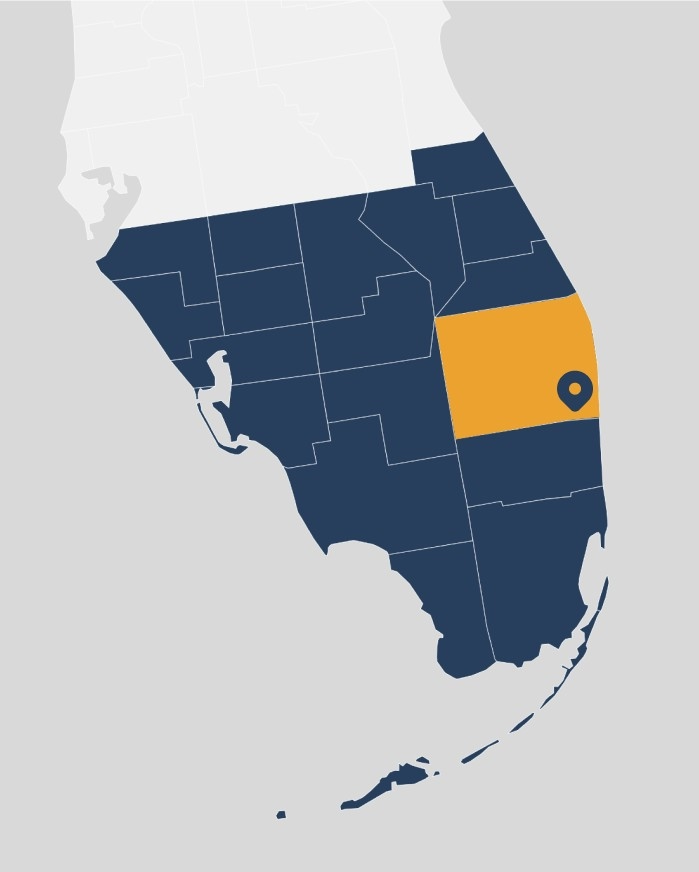.avif)
West Palm Beach Theft Attorneys
When the shadow of theft charges looms over you in West Palm Beach, every decision you make can have lasting consequences. At South Florida Justice, we don't just defend cases — we defend futures. Our team of battle-tested theft attorneys brings decades of courtroom experience and a deep understanding of Florida's complex theft laws to your side.

Our Track Record of Success
Theft Charges We Handle
Our West Palm Beach theft lawyers defend clients against a wide range of theft-related charges, including:
- Petit Theft
Under Florida Statute §812.014, petit theft involves property valued at less than $750. While it may seem minor, even a misdemeanor conviction can have lasting consequences on your employment prospects and personal life. We will work tirelessly to keep your record clean, exploring options like pretrial diversion programs or negotiating for reduced charges.
- Grand Theft
When the value of stolen property exceeds $750, you're facing grand theft charges under Florida Statute §812.014(2)(c). These felony offenses carry severe penalties, including potential prison time and hefty fines. Our experienced theft attorneys will scrutinize every detail of the prosecution's case, from challenging property valuations to questioning witness credibility.
- Shoplifting
Also known as retail theft, shoplifting is governed by Florida Statute §812.015. Charges can range from second-degree misdemeanors to first-degree felonies, depending on the value of goods and prior convictions.
We understand the nuances of Florida's retail theft laws and will work to minimize the impact on your life, potentially negotiating for civil penalties in lieu of criminal charges.
- Burglary
Often accompanying theft allegations, burglary charges fall under Florida Statute §810.02. This serious felony involves entering a structure with the intent to commit an offense. We'll scrutinize every detail, from the legality of any searches to the prosecution's evidence of intent, potentially arguing for lesser included offenses like trespass.
- White Collar Theft
Embezzlement, fraud, and other financial crimes require a sophisticated defense. Governed by various statutes, including Florida Statute §812.081 for trade secret theft, these cases often involve complex paper trails and financial records. Our legal team has the experience to handle these intricate cases, working with forensic accountants when necessary to build a robust defense.
- Carjacking
A violent form of vehicle theft, carjacking is a first-degree felony under Florida Statute §812.133. We understand the severe penalties associated with this charge and will explore every avenue of defense, from challenging eyewitness identifications to examining potential alibi evidence.
- Receiving Stolen Property
Even if you didn't steal the item yourself, knowingly receiving or dealing in stolen property is a serious offense under Florida Statute §812.019. Our attorneys will work to prove a lack of knowledge or challenge the prosecution's evidence of the property's stolen nature.
- Your Freedom Is on the Line: Fight Back Today
A theft conviction can impact your life for years to come, affecting your job prospects, housing options, and personal relationships. At South Florida Justice, we have the experience to challenge these charges and protect your future.
Get in Touch with UsAvailable 24/7(561) 659-8337
What Is the Potential Impact of a Theft Conviction?
A theft conviction can have far-reaching consequences beyond fines and potential jail time:
- Employment challenges: Many employers are reluctant to hire individuals with theft convictions.
- Housing difficulties: Landlords often conduct background checks and may deny housing to those with theft records.
- Professional licenses: Certain professions may revoke or deny licenses based on theft convictions.
- Immigration issues: Non-citizens may face deportation or inadmissibility due to theft convictions.
- Educational opportunities: Some colleges and universities consider criminal records in admissions decisions.
- Personal relationships: The stigma of a theft conviction can strain personal and professional relationships.
Don't let a theft charge derail your future. Our West Palm Beach theft attorneys will fight relentlessly to protect your rights and your reputation.
Understanding Florida Theft Laws
Defining Theft in Florida
Under Florida Statute §812.014, theft occurs when a person knowingly obtains or uses, or endeavors to obtain or use, the property of another with intent to:
- Deprive the other person of a right to the property or a benefit from the property.
- Appropriate the property to their own use or to the use of any person not entitled to the use of the property.
This broad definition covers a wide range of actions, from shoplifting to complex financial fraud. It's important to note that even temporary deprivation of property can constitute theft under Florida law.
Theft Classifications and Penalties
The severity of theft charges, incarceration lengths, and fines in Florida depend primarily on the value of the stolen property:
- Second-degree petit theft (2nd degree misdemeanor)
- Property valued at less than $100
- Up to 60 days in jail and a $500 fine
- First-degree petit theft (1st degree misdemeanor)
- Property valued between $100 and $750
- Up to 1 year in jail and a $1,000 fine
- Third-degree grand theft (3rd degree felony)
- Property valued between $750 and $20,000
- Up to 5 years in prison and a $5,000 fine
- Second-degree grand theft (2nd degree felony)
- Property valued between $20,000 and $100,000
- Up to 15 years in prison and a $10,000 fine
- First-degree grand theft (1st degree felony)
- Property valued at $100,000 or more
- Up to 30 years in prison and a $10,000 fine
It's essential to note that certain items, such as firearms, wills, motor vehicles, or controlled substances, can elevate charges regardless of value. Additionally, Florida Statute §812.0155 allows for the suspension of a defendant's driver's license as a penalty for certain theft convictions.
Statutes of Limitations
Understanding the statute of limitations is crucial in theft cases. In Florida, the time limit for bringing charges varies based on the severity of the offense:
- Misdemeanor theft: 2 years from the date of the alleged offense
- Third-degree felony theft: 3 years
- Second-degree felony theft: 3 years
- First-degree felony theft: 4 years
However, it's important to note that under Florida Statute §812.035(10), the statute of limitations can be extended in cases involving ongoing schemes or conspiracies. Our experienced theft defense attorneys will carefully examine the timeline of your case to ensure charges are brought within the legal limits.
Enhanced Penalties for Repeat Offenders
Florida law imposes harsher penalties on repeat offenders. Under Florida Statute §812.014(3), a third or subsequent petit theft conviction can be charged as a third-degree felony, regardless of the property's value. This underscores the importance of combating every theft charge vigorously, even seemingly minor ones.
Why Choose South Florida Justice for Your Theft Defense?

Areas We Serve
From our centrally located West Palm Beach office, we're in a position to respond quickly to theft cases throughout South Florida, including:
- Palm Beach County
- Miami-Dade County
- Broward County
- St. Lucie County
- Martin County
- Okeechobee County

.avif)
Frequently Asked Questions
- What should I do if I'm accused of theft?
If someone accuses you of theft, remain calm and exercise your right to remain silent. Do not discuss the accusations with anyone except your attorney. Politely decline to answer questions or consent to searches without a warrant.
Most importantly, contact an experienced theft defense attorney immediately. At South Florida Justice, we're available 24/7 to protect your rights and begin building your defense. Call us now at (561) 659-8337 for a free consultation.
- Can shoplifting charges be expunged from my record in Palm Beach County?
Possibly. Florida law allows for the expungement of certain theft charges, including some shoplifting offenses. If you complete a pretrial diversion program or if your case is dismissed, you may be eligible for expungement.
- What if I accidentally left a store without paying for an item?
Intent is a crucial element of theft charges. If you genuinely forgot to pay, that's not theft. However, proving a lack of intent can be challenging. It's essential to contact a skilled theft attorney immediately to protect your rights and build a strong defense.
- Can I still be charged with theft if I returned the item?
Potentially, yes. While returning stolen property may help your case, it doesn't automatically negate the original theft. The prosecution may still argue that you had the intent to deprive the owner of the property, even temporarily. Our WPB theft defense attorneys can help present your actions in the most favorable light.
- What's the difference between theft and robbery?
Theft involves taking property without the owner's consent, while robbery involves the use of force, threats, or intimidation during the act of taking property.
- Can I be charged with theft for using someone else's credit card, even if they gave me permission?
Using someone else's credit card, even with verbal permission, can lead to theft charges. Always get written authorization and be prepared to prove you had permission.


.svg)

.svg)

.svg)

.svg)


.svg)
.svg)
.svg)
.svg)
.svg)
.svg)
.svg)
.svg)
.svg)
.svg)
.svg)